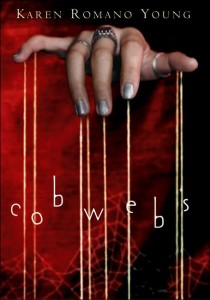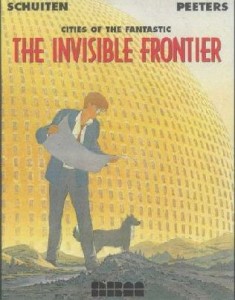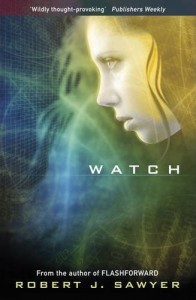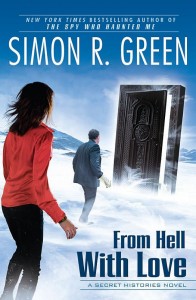

 Coraline Jones is a bright young girl with the soul of an explorer, and the heart of a hero. When her family moves into their new flat, she occupies herself with exploring her new environs. This leads her to the strange old man with the mouse circus, and the elderly ladies downstairs who once used to be actresses. It also leads Coraline to the mysterious fourteenth door in her flat, a door that leads nowhere, kept locked at all times. Being curious, Coraline naturally unlocks this door one day, and enters a nightmarish copy of her own world. In this world, cats talk, dogs attend perpetual theatrical performances, and twisted versions of her parents with buttons for eyes tempt her with delights and dreams. Being wise, Coraline rejects these temptations for the safe familiarity of home. For a time. But when her parents vanish, Coraline is forced to go back into this bizarre other world, and utilize every ounce of courage and cunning and her explorer’s spirit in order to win back her normal life. Even with the help of an aloof cat and a magical rock, can she withstand the might of something very old, and very unaccustomed to losing? Coraline, her parents, and the previous victims of this unearthly ‘other mother’ all hang in the balance, relying upon the wits of a little girl.
Coraline Jones is a bright young girl with the soul of an explorer, and the heart of a hero. When her family moves into their new flat, she occupies herself with exploring her new environs. This leads her to the strange old man with the mouse circus, and the elderly ladies downstairs who once used to be actresses. It also leads Coraline to the mysterious fourteenth door in her flat, a door that leads nowhere, kept locked at all times. Being curious, Coraline naturally unlocks this door one day, and enters a nightmarish copy of her own world. In this world, cats talk, dogs attend perpetual theatrical performances, and twisted versions of her parents with buttons for eyes tempt her with delights and dreams. Being wise, Coraline rejects these temptations for the safe familiarity of home. For a time. But when her parents vanish, Coraline is forced to go back into this bizarre other world, and utilize every ounce of courage and cunning and her explorer’s spirit in order to win back her normal life. Even with the help of an aloof cat and a magical rock, can she withstand the might of something very old, and very unaccustomed to losing? Coraline, her parents, and the previous victims of this unearthly ‘other mother’ all hang in the balance, relying upon the wits of a little girl.
Coraline is like a Gothic Alice in Wonderland, alternatively absurd and chilling, infused with a very real sense of danger to the heroine, as well as the reassurance that everything might be okay if she keeps a cool head. It’s sly and imaginative as only Neil Gaiman could imagine, filled with his trademark wit, attention to voice, and complex ideas. Bricked-up doors leading to a disturbing copy of our own world, hands that click and crawl around separate from a body, ghostly children trapped behind a mirror, and talking animals invoke the very best fairy tales and Victorian parlor tales, without talking down to the children’s audience it’s aimed at. With appropriately twisted illustrations by frequent Gaiman collaborator, artist Dave McKean, Coraline is sure to please, as well as influence the reader to leave a nightlight on afterwards. Just in case. Gaiman has long been noted for his award-winning Sandman comic book series and his more adult literary efforts, such as American Gods, but with this all-ages-appropriate offering, he really shines.
 Nancy Greene-Kara leads a strange life, dancing her way between her father’s rooftop dwelling and her mother’s basement apartment, finding a middle ground on the streets of Brooklyn. The child of two distinct and disparate heritages (her father a child of Anansi, the African-Jamaican spider trickster figure, her mother a descendant of Scottish orb weaver spiders such as inspired Robert the Bruce), Nancy is balanced between the two, though as of yet, displaying characteristics of neither. But that’s all about to change, as Nancy stands poised on the edge of something rich and special. But will she understand what’s happening to her body and her heart in time to harness the power and take charge of her life? And just how does the strange young man, Dion, who’s been following her, tie in to it all? As if that wasn’t enough, Nancy’s family is hiding mysteries left and right, and there’s the matter of the Angel of Brooklyn, the unseen figure who stops muggings and other crimes by dropping things off rooftops. But it’s all part of growing up when you’re part of the hidden magic of the world, and Nancy’s time of self-discovery, though it comes at some cost, will open the door to a wider existence.
Nancy Greene-Kara leads a strange life, dancing her way between her father’s rooftop dwelling and her mother’s basement apartment, finding a middle ground on the streets of Brooklyn. The child of two distinct and disparate heritages (her father a child of Anansi, the African-Jamaican spider trickster figure, her mother a descendant of Scottish orb weaver spiders such as inspired Robert the Bruce), Nancy is balanced between the two, though as of yet, displaying characteristics of neither. But that’s all about to change, as Nancy stands poised on the edge of something rich and special. But will she understand what’s happening to her body and her heart in time to harness the power and take charge of her life? And just how does the strange young man, Dion, who’s been following her, tie in to it all? As if that wasn’t enough, Nancy’s family is hiding mysteries left and right, and there’s the matter of the Angel of Brooklyn, the unseen figure who stops muggings and other crimes by dropping things off rooftops. But it’s all part of growing up when you’re part of the hidden magic of the world, and Nancy’s time of self-discovery, though it comes at some cost, will open the door to a wider existence.
Imagine if Charles de Lint and Francesca Lia Block got together for a jam session, and the result was a coming-of-age romance set on the rooftops of Brooklyn. The blending of the everyday world and the hidden magic is seamless, the text weaving its spell like a patient spider of its own. Karen Romano Young really manages to bring out the lure of the urban environment, infusing it with a rare love and sense of mystique. This was one of those books I just couldn’t put down until I was finished. She’s a worthy and welcome addition to the urban fantasy genre, and I hope we see more of her soon.
 Clemency Pogue isn’t your average child. She wears burlap pants she made herself, listens to the outrageous tales told by her parents, and spends her vacation days wandering the nearby woods, amusing herself. However, when a wicked fairy decides to torment her mercilessly, Clemency is forced to fall back on the deadliest weapon in her imagination’s arsenal. Drawing from Peter Pan, she cries “I don’t believe in fairies,” over and over until the fairy molesting her drops dead. Unfortunately, there are innocent causalities as a result: six other fairies across the world have dropped dead thanks to her random disbelieving. And not all of those fairies were wicked ones who deserved to die. Now, accompanied by a hobgoblin she’s won over to her service, Clemency has to magically travel the world, discovering the names and functions of her victims, and bringing them back to life with the power of her belief. She’ll encounter fairies of all kinds: the Fairy of Noninvasive Surgery, the Fairy of Instinct and Wisdom, the Tooth Fairy, a Fire Fairy, and of course her nemesis, the Fairy of Frequent and Painful Pointless Antagonism. Luckily, she’s a quick-witted, intelligent, resourceful girl.
Clemency Pogue isn’t your average child. She wears burlap pants she made herself, listens to the outrageous tales told by her parents, and spends her vacation days wandering the nearby woods, amusing herself. However, when a wicked fairy decides to torment her mercilessly, Clemency is forced to fall back on the deadliest weapon in her imagination’s arsenal. Drawing from Peter Pan, she cries “I don’t believe in fairies,” over and over until the fairy molesting her drops dead. Unfortunately, there are innocent causalities as a result: six other fairies across the world have dropped dead thanks to her random disbelieving. And not all of those fairies were wicked ones who deserved to die. Now, accompanied by a hobgoblin she’s won over to her service, Clemency has to magically travel the world, discovering the names and functions of her victims, and bringing them back to life with the power of her belief. She’ll encounter fairies of all kinds: the Fairy of Noninvasive Surgery, the Fairy of Instinct and Wisdom, the Tooth Fairy, a Fire Fairy, and of course her nemesis, the Fairy of Frequent and Painful Pointless Antagonism. Luckily, she’s a quick-witted, intelligent, resourceful girl.
Hopefully, this is just the first of many Clemency Pogue books to come. It’s a genuinely fun, whimsical fairy tale that keeps its tongue firmly in cheek even as it delivers a wholly enjoyable plot filled with quirky, memorable characters. It’s reminiscent of the Spiderwick Chronicles, but on a somewhat sillier, younger level. It certainly has plenty of appeal, and the lovely illustrations which pepper the pages are a nice accompaniment. Petty and Davis may just have a hit on their hands.
 A tangled bureaucracy. A young cartographer. The encroachment of new technologies and new ideas. A strange woman whose body is marked with lines that may represent a map of some sort. This is the world of Sodrovno-Voldachia, a land which eerily reimagines and resembles what was once Yugoslavia in the real world. This is the world of Roland, new to the profession of cartographer, and caught up in events he doesn’t yet understand.
A tangled bureaucracy. A young cartographer. The encroachment of new technologies and new ideas. A strange woman whose body is marked with lines that may represent a map of some sort. This is the world of Sodrovno-Voldachia, a land which eerily reimagines and resembles what was once Yugoslavia in the real world. This is the world of Roland, new to the profession of cartographer, and caught up in events he doesn’t yet understand.
The Invisible Frontier is part one of a two book set of graphic novels by acclaimed Belgian authors, Benoit Peeters and Francois Schuiten. The story is strangely fascinating, but where this book really shines is in the art. It manages to mix realism and a certain idealized dreamlike quality to produce something straight out of Kafka or Metropolis: all high buildings and retro-technology and an immense dome that houses the Center for Cartography. The colors, however muted, bring out the richness of the lines, and the prevalence of curves, further adding to that unreal quality. Beautiful and intelligent, this is a graphic novel that is sure to fascinate as well as entertain. Due to some nudity and a somewhat complex storyline, this book probably shouldn’t be aimed at younger readers. Also, be aware that this is part one; the conclusion of the story won’t be out for some time. More information may be found at www.nbmpublishing.com.
Due to circumstances beyond my control, my Realms of Fantasy YA review column for the August 2010 issue, currently on the newsstands, was run online at the Realms website instead of in the magazine. You can thus find the column here for your viewing pleasure.
I cover the following books:
Guardian of the Dead by Karen Healey
A Wizard of Mars by Diane Duane
Hex Hall by Rachel Hawkins
The Dead-Tossed Waves by Carrie Ryan
The Shadow Hunt by Katherine Langrish
Other by Karen Kincy
Fever Crumb by Philip Reeve
Princess For Hire by Lindsey Levitt
This World We Live In by Susan Beth Pfeffer
Hey! I love urban fantasy. I also review it. And recently, I caught up on some of my backlog, as well as covering some newer releases. The end result is a nice sampling of reviews which have gone live over at The Green Man Review.
Have fun.
Inhuman Resources by Jes Battis
Ghosts & Echoes by Lyn Benedict
Hard Magic by Laura Anne Gilman
The Last Stormlord by Glenda Larke
Steamed by Katie MacAlister
Ghost of a Chance by Simon R. Green
Succubus Shadows by Richelle Mead
Black Blade Blues by J.A. Pitts
Dead Matter by Anton Strout
Love them? Hate them? I welcome all feedback. Are you an author who wants me to consider reviewing you? As always, feel free to contact me. I don’t bite. Much. In the meantime, I’ll be over here, perfecting my latest chili recipe.
These reviews have gone live online on SF Site:
WWW: Watch by Robert Sawyer
From Hell With Love by Simon R. Green
Belatedly, these ran over at Green Man Review:
Master of None by Sonya Bateman
Red Hood’s Revenge by Jim C. Hines
Death Most Definite by Trent Jamieson
 Blind from birth, 15-year-old Caitlin Dector underwent an experimental procedure designed to grant her sight. It worked, in a fashion; with the aid of a device she calls her “eyePod” she can receive and decipher the same visual cues as everyone else. She can also see the data flow of the Internet, visualizing its existence like no one else. This made her uniquely suited for first contact with the so-called Webmind, a spontaneously emerging consciousness existing only on the Web. Even as Caitlin learns to see the world around her for the first time, the Webmind, which can see and hear what she hears through the eyePod, is learning alongside her.
Blind from birth, 15-year-old Caitlin Dector underwent an experimental procedure designed to grant her sight. It worked, in a fashion; with the aid of a device she calls her “eyePod” she can receive and decipher the same visual cues as everyone else. She can also see the data flow of the Internet, visualizing its existence like no one else. This made her uniquely suited for first contact with the so-called Webmind, a spontaneously emerging consciousness existing only on the Web. Even as Caitlin learns to see the world around her for the first time, the Webmind, which can see and hear what she hears through the eyePod, is learning alongside her.
As more people learn of Webmind’s existence, some accept it with trepidation and optimism, others with fear and worse. How will they deal with an alien mind capable of knowing our secrets, able to spy on us and manipulate the Internet, existing everywhere and nowhere? The Webmind can’t stay a secret for long, and the time for it to choose its purpose for existing is approaching far too quickly. Is it here to help, or harm?
Like the first in the trilogy, WWW: Watch unfolds through a variety of narrators, including Caitlin and Webmind, but also spilling over to more peripheral characters such as the government agencies who stumble across Webmind’s existence, and a primate researcher engaged in interspecies communication. Everyone has their role to play in this story, and the threads all begin to connect, showing us how we’re all connected. From America to Canada, Japan to Israel, the pieces come together as Webmind’s intelligence and experience grows in leaps and bounds, and its sense of self solidifies.
There’s no middle book syndrome here; Robert J. Sawyer packs as much thought and development into this volume as he did into the first, turning out a compelling, thought-provoking entry in one of his best series to date. He’s one of those few writers who can be equally at home dealing with characters’ personal lives and tackling the hard science in an accessible way. Sure, there’s a lot of infodumping between characters, and some of it ranges all over the place — he hits upon game theory, morality, religion, George Orwell, Star Trek, autism, Japanese military history, and so much more — but these discussions rarely feel out of place. I suppose it’s because Sawyer’s careful to populate his books with intelligent, articulate characters who can talk about those sorts of things like some of us would discuss sports, but under the circumstances, it works.
WWW: Watch is probably as accurate and sophisticated an exploration of emergent consciousness on the Web as we’re ever to find until the real thing happens. Grounded in the pop culture and online trends of the moment, it feels authentic. It’s optimistic, intelligent, and I can’t wait for the third in the series.
 When it comes to secret organizations dedicated to protecting the world from all threats, both internal and external, no group is as resourceful, widespread, or potentially insane as the Droods. And of that infamous family, none is as dangerous or misunderstood as Eddie Drood, who has saved the world more than a few times in his checkered career. After a stint as head of the family, he’s back to being a nice, normal field agent like he prefers. Unfortunately, subtlety is not his strong point, and after a rather embarrassing incident involving a destroyed Los Angeles hotel, he’s been called home to explain himself. Perfect timing, then, for the Matriarch of the family to be murdered and Eddie’s own girlfriend, the mercurial Molly Metcalf, Wild Witch of the Woods, to be implicated. Things quickly get out of hand, and a bad situation turns tragic.
When it comes to secret organizations dedicated to protecting the world from all threats, both internal and external, no group is as resourceful, widespread, or potentially insane as the Droods. And of that infamous family, none is as dangerous or misunderstood as Eddie Drood, who has saved the world more than a few times in his checkered career. After a stint as head of the family, he’s back to being a nice, normal field agent like he prefers. Unfortunately, subtlety is not his strong point, and after a rather embarrassing incident involving a destroyed Los Angeles hotel, he’s been called home to explain himself. Perfect timing, then, for the Matriarch of the family to be murdered and Eddie’s own girlfriend, the mercurial Molly Metcalf, Wild Witch of the Woods, to be implicated. Things quickly get out of hand, and a bad situation turns tragic.
In the aftermath, Eddie’s left chasing ghosts and rumors to seek the Matriarch’s true killer. Soon he’s on the trail of the Immortals, an ancient family that’s the opposite of the Droods in every way, undying shapeshifters who could be anyone, anywhere, doing what they please without rhyme, reason or consequence. Worse still, the Immortals have recruited the infamous Drood traitor, Tiger Tim, and the evil genius, Doctor Delirium, as unlikely allies. Worst of all, the dread Apocalypse Door has been put into play; if it opens, all Hell will break loose. From one end of the world to the next, from Castle Frankenstein to Area 52, it’s all-out war between the Droods and the Immortals, and the last man standing isn’t necessarily who you’d expect.
From Hell With Love adds another chapter to the grand saga Simon R. Green’s been constructing over dozens of books and multiple series. Characters from the Nightside, Drinking Midnight Wine, and Shadows Fall all make appearances or are name checked as he ties together all his different works. Meanwhile, we get even more insight into the secret world of the Droods and their long-lived arch foes, and get an idea of the stakes at hand. Like the rest of this series, it’s an odd blend of action, science fiction, fantasy, and pulp weirdness, which somehow works despite itself. It’s an epic adventure that gleefully goes over-the-top with a stylized, exaggerated style all its own.
Heroes and villains strut their stuff across a worldwide stage, and the end result is something so entertaining, it’s almost a guilty pleasure. This will never be Great Literature, but you always get your money’s worth of popcorn enjoyment from a Green book, and From Hell With Love definitely maintains that standard. The cliffhanger pretty much guarantees readers will be back for the next in the series, but I’d come back anyway just to see what the heck happens next.
These reviews originally ran in Realms of Fantasy, cover-dated June 2010, and can now be found here.
I Kissed A Zombie and I Liked It by Adam Selzer
The Iron King by Julie Kagawa
Fallen by Lauren Kate
Undead Much? by Stacey Jay
Wish by Alexandra Bullen
Hearts at Stake by Alyxandra Harvey
The Dark Divine by Bree Despain
Magic Under Glass by Jaclyn Dolamore
Firespell by Chloe Neill
